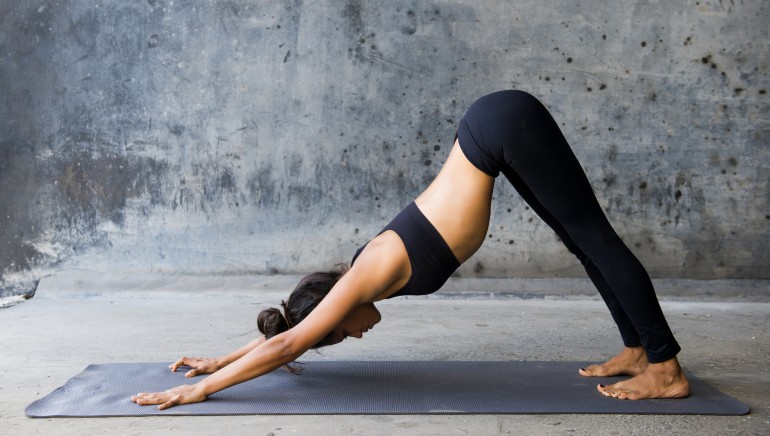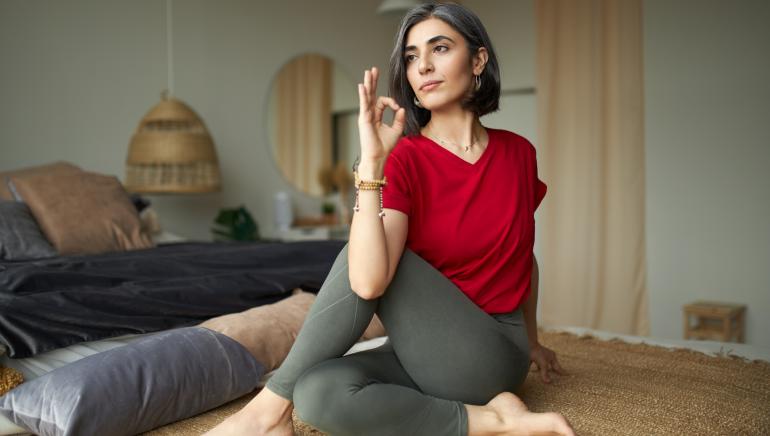Yoga for Flexibility: A 5-minute yoga flow to get rid of stiff muscles

- 198
“You need to be flexible to do yoga” is a big fat myth. “You can increase your flexibility by practicing yoga regularly” is a fact. Flexibility is a vital aspect of physical well-being, contributing to increased mobility and reduced risk of injury. In the hustle bustle of everyday life, people are falling prey to the perils of poor posture, long sitting hours, unhealthy eating habits and weight gain. Yoga, with its gentle and mindful approach, can help you improve flexibility gradually – even if you do it just 5 minutes in a day! For International Yoga Day 2023, certified yoga trainer Swati Kain has shared the need to choose yoga to improve flexibility flexibility.
Whether you’re a beginner or experienced yogi, incorporating these yoga poses for a stiff body into your routine can help you achieve a greater range of motion and improve overall flexibility. It is also the need of the hour for young professionals, who are either caught in the web of laptop and mobile phone usage or running helter-skelter. Taking out 5 minutes a day for your health, should not be a problem, believes certified yoga expert Swati Kain, who has shared this special yoga flow.
Yoga poses to improve flexibility
By doing the following yoga poses in a flow, one after the other, you can achieve the flexibility you have been wishing for. These yoga stretches help the body muscles to open up – whether you have stiff knees, stiff legs or a stiff back!
1. Cat pose (Marjariasana)
Begin the flow with the cat pose, a dynamic movement that stretches the spine and increases flexibility in the neck, back and shoulders. It promotes a gentle warm-up of the entire spine, improving flexibility and mobility in the vertebral column.
How to do it:
Assume a position on your hands and knees, with your hands positioned beneath your shoulders and your knees positioned under your hips. Inhale as you lift your tailbone, drop your belly, and look up, creating a concave shape in your lower back (cow pose). Exhale as you round your spine, tuck your tailbone, and drop your head (cat pose). Flow between these two poses, syncing the movement with your breath, for a few rounds to warm up your spine and increase flexibility in your neck, back, and shoulders.
2. Rabbit Pose (Shashankasana)
This pose increases flexibility in the shoulders and neck, allowing for improved posture and range of motion.
How to do:
Position yourself by kneeling on the floor, allowing your buttocks to rest comfortably on your heels. Exhale as you bend forward, lowering your forehead toward the floor and extending your arms alongside your body. Lengthen your spine as you stretch your back muscles and feel the gentle stretch in your spine, shoulders, and neck. Hold the pose for several breaths, gradually deepening the stretch as your body allows.
3. Downward Facing Dog (Adho Mukha Shvanasana)
This stretches and lengthens the entire body, targeting the hamstrings, calves, and back muscles. This pose helps relieve tension, increases flexibility in the legs, and promotes a sense of overall body awareness.
How to do:
From a tabletop position, lift your hips and straighten your legs, creating an inverted V shape with your body. Press your palms into the mat, fingers spread wide, and actively push the floor away. Engage your core, relax your neck, and let your heels reach toward the ground. Feel the stretch in your hamstrings, calves, and back muscles. Hold the pose for a few breaths, focusing on lengthening your spine and enjoying the stretch.

Also read: Cat-cow v/s downward and upward facing dog: An expert gives a lowdown on yoga poses you must try
4. Half Pigeon Pose (Ardha Rajkapotasana)
Next, incorporate the half pigeon pose, a deep hip opener that releases tension in the hips and groin area. This pose enhances flexibility in the hip flexors, outer thighs, and glutes, providing a greater range of motion and improved mobility.
How to do:
Begin by assuming a high plank position, and then bring your right knee forward, positioning it behind your right wrist. Extend your left leg straight back, ensuring your hips are square. Slowly lower your upper body toward the ground, resting on your forearms or a block for support. Feel the deep stretch in your hip flexors, outer thigh, and glutes. Maintain the pose for a few breaths before proceeding to repeat the sequence on the opposite side.
Watch the yoga flow for flexibility by Swati Kain for Health Shots now!
5. Head to Knee Pose on the side (Parivritta Janu Shirshasana)
Transition into the seated head to knee pose on the side, which stretches the hamstrings, calves, and lower back while providing a gentle twist to the spine. This pose helps improve flexibility in the legs, spine, and shoulders, promoting better alignment and reducing the risk of muscle imbalances.
How to do:
Take a seated position with your legs stretched out in front of you. Bend your right knee and bring the sole of your right foot to the inside of your left thigh. Inhale and lift your arms overhead. Exhale as you twist your torso to the left, reaching your left hand toward your right foot and your right hand behind you for support. Lengthen your spine and feel the stretch in your hamstrings, calves, and lower back. Pause and hold the pose for a few breaths before transitioning to the other side to repeat the sequence.
6. Seated Twist (Ardha Matsyendrasana)
Continue the flow with the seated twist pose, which targets the spine, hips, and shoulders. This twisting motion enhances spinal flexibility, releases tension, and improves digestion. It also stimulates the internal organs, promoting overall well-being.
How to do:
Assume a seated position, with your legs stretched out in front of you. Bend your right knee and place your right foot on the outside of your left thigh. Inhale and lengthen your spine, then exhale as you twist your torso to the right, placing your left elbow on the outside of your right knee. Use each inhale to lengthen your spine, and each exhale to deepen the twist. Feel the stretch in your spine, hips, and shoulders. Hold the pose for several breaths before switching sides.

7. Shavasana (Corpse Pose)
Complete the gentle yoga flow with savasana, the final relaxation pose. Allow yourself to fully relax, integrating the benefits of the previous poses and promoting deep rest and rejuvenation.
How to do:
Lie on your back, allowing your body to fully relax. Extend your legs and arms alongside your body, palms facing up. Close your eyes and focus on your breath, allowing any tension to melt away. Stay in this pose for a few minutes, completely surrendering and integrating the benefits of the previous poses. Use this time for deep rest and rejuvenation.
Remember, flexibility is not about achieving perfect poses right away. It’s a gradual process that requires regular practice and patience. Embrace the journey and listen to your body as you explore these poses. With consistent effort and dedication, you can experience the transformative benefits of a flexible body!
Get latest updates on health and wellness along with Fitness, Muscle Gain, Staying Fit, Weight Loss











